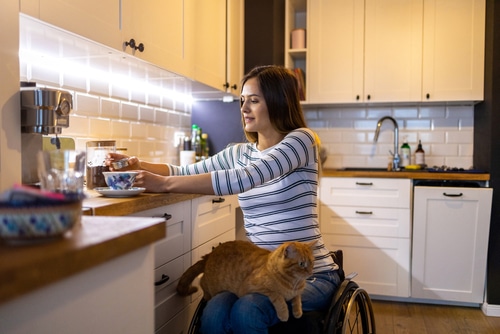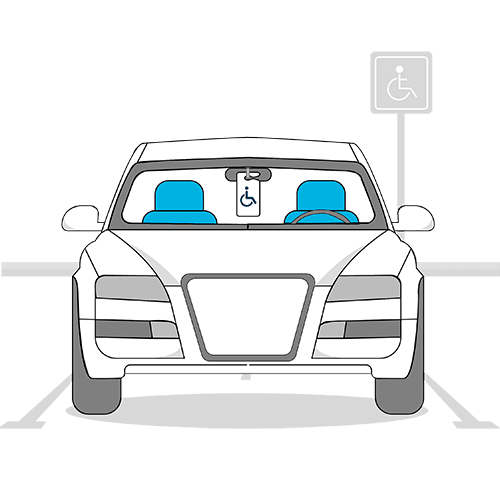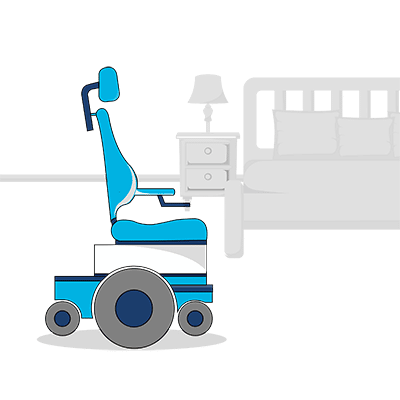If your mobility is limited, it doesn’t mean you can’t enjoy the company of a pet. While you might not want a bouncy young Labrador, there are plenty of low maintenance pets who could bring extra happiness into your life.
And it’s not just us saying you should get a pet. Science shows there are physical benefits of owning a pet, as well as benefits for our mental wellbeing. Regardless of the reason you have limited mobility, adding a pet into your life might be a smart move.
Here’s how to choose low maintenance pets to suit your lifestyle.
Should people with limited mobility have pets?
Yes! As long as you’re willing to spend enough time caring for an animal and giving it the attention it wants (some need this more than others), you can definitely provide a pet the kind of home it deserves. Even with limited mobility. However, you need to choose your pet carefully in order to make sure you’re a good match.
Doing plenty of research before adopting a pet gives you a much better chance of ending up with one you can provide a forever home for. And that’s the key point. The animal will be with you for many years so best to know what to expect, then there’s a greater likelihood of choosing the most appropriate companion.
Key considerations when making a pet choice
When you’re thinking about low maintenance pets which could suit your lifestyle, even with limited mobility, here are some factors to consider:
- What level of mobility do you have? The criteria for a pet might be different for someone who uses a wheelchair for their daily activities though has lots of energy to burn versus somebody who can walk around the house but is constantly coping with chronic pain, for instance.
- How much space do you have? Is there a way for a pet to get some exercise without you needing to walk or exercise alongside them?
- What is your general health like? Will your pet often need to spend a day or so alone while you go to appointments or treatments?
- Are your disability or disabilities likely to deteriorate, improve, or stay the same? If you won’t be as mobile in the future, will you have people around to help with your pet?
- Are any other circumstances likely to change soon? Will you move to a smaller place? Will you be spending more time at work? Are your family dynamics stable?
- What do you want from a pet? Do you want an animal who’ll sit on the couch and cuddle with you, or do you prefer a loving but more hands-off relationship? For example, a cat and a fish are both good low maintenance pet options for people with limited mobility, but would suit different personalities.
Then of course there’s the question of budget – how much money do you have to feed the pet, buy equipment for it, provide it with medical care when needed, etc?

The best low maintenance dogs
Most people automatically assume dogs aren’t low maintenance pets. And it’s true they can sometimes take a lot of work. But if you’re careful about the dog you choose, limited mobility shouldn’t stop you from having a dog in your life.
The first thing to consider is the breed of dog. Although not all dogs are typical of their breed, there are certainly some who require a lot of maintenance. For instance, high energy dogs like Border Collies require an active owner who can walk or run with them regularly. Dogs with long coats often need more grooming and maintenance in that regard, too.
Some of the lowest maintenance dog breeds include Pugs, Dachshunds, Bassets, and Maltese. All of these dogs have low exercise and grooming needs, and are typically easygoing and happy to spend time relaxing with their owners.
The second thing to consider is the age of the dog. Puppies are usually more playful and require a lot more exercise, play time, training effort, and general supervision. Once they’re toilet trained and out of the chewing and zooming around stage though, many dogs become much more low maintenance pets.
So if you do get a dog, why not consider adopting a mature adult dog who’s already house trained and settled down? An overlooked shelter dog could find their forever home, and you get to enjoy all the benefits of dog ownership without the stress of raising a puppy.
Are cats low maintenance pets?
Cats are a good alternative to dogs if you want an affectionate and (potentially) snuggly low maintenance pet. Because cats are typically more independent than dogs, you don’t usually have to supervise them as much.
They’re normally happy to take care of themselves, and can get in and out through an open window or cat flap. Meaning you don’t need to get up and about to let them out every five minutes! Plus, they usually toilet train very quickly and are quite clean so there’s much less picking up after them.
And aside from scratches in your furniture and carpet (very likely unless you find them the right scratching post, and/or scratch deterrent spray/tape) they’re less likely to cause damage to your home.
If your mobility is limited, you’ll also be glad you don’t need to walk your cat. Again, some cat breeds require more maintenance than others. Your standard mixed breed house cat is a great choice, of course. If you want a pedigree cat, some good breeds include Persian cats and British Shorthairs.
Other low maintenance pets
Although cats and dogs are the most common pets in Australia, they’re not the only ones. If a dog or cat isn’t right for you, there are plenty of other low maintenance pets you might enjoy. After all, as long as the pet brings you joy and comfort, it doesn’t matter what form they come in.
These could include birds, rats, or even snakes. Read about the lowest maintenance pets for apartments for some companion animal inspiration. Since we’re talking pets, be sure to also read about nifty pet hair removal tips for limited mobility.
Insurance for wheelchairs and mobility scooters
We know how important your wheelchair and/or mobility scooter is to you – a tie with or close second to your potential new furry friend, perhaps? If your limited mobility requires you to use a wheelchair or mobility scooter, is it adequately insured?
Taking out a specialised insurance policy means you’re protected financially if your precious mobility equipment is damaged or stolen. Intrigued? Find out more about our wheelchair insurance and mobility scooter insurance. The same goes for our Blue Badge pet insurance for your new animal companion – make sure they’re safeguarded against life’s mishaps too.








